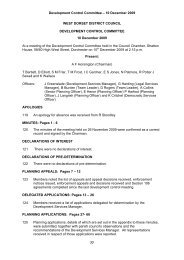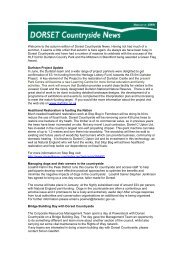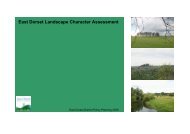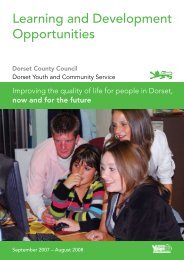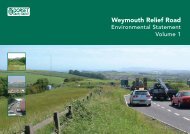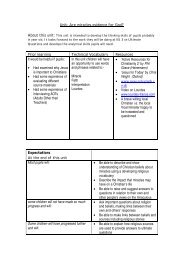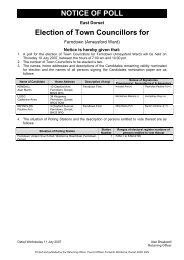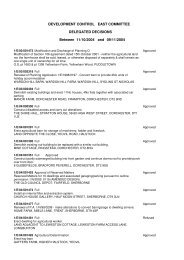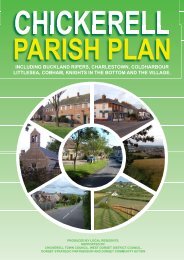policy for gifted and talented children ... - Dorsetforyou.com
policy for gifted and talented children ... - Dorsetforyou.com
policy for gifted and talented children ... - Dorsetforyou.com
You also want an ePaper? Increase the reach of your titles
YUMPU automatically turns print PDFs into web optimized ePapers that Google loves.
DORSET CHILDREN’S SERVICES<br />
POLICY FOR GIFTED AND TALENTED CHILDREN<br />
Purpose of the <strong>policy</strong><br />
The purpose of this <strong>policy</strong> is to establish an agreed framework with schools <strong>for</strong> the<br />
effective provision <strong>for</strong> <strong>gifted</strong> <strong>and</strong> <strong>talented</strong> <strong>children</strong> in Dorset. It is based on national<br />
guidance <strong>and</strong> research <strong>and</strong> reflects the best practice that is already taking place in<br />
schools in Dorset, <strong>and</strong> is in accordance with the authority’s Inclusion Strategy.<br />
The <strong>policy</strong> is ac<strong>com</strong>panied by a local authority strategy <strong>for</strong> <strong>gifted</strong> <strong>and</strong> <strong>talented</strong><br />
<strong>children</strong>, which provides annual objectives <strong>for</strong> the development of provision. The<br />
<strong>policy</strong> is also <strong>com</strong>plemented by a range of guidance documents, which provides<br />
more detailed in<strong>for</strong>mation <strong>and</strong> examples of good practice in Dorset.<br />
Definition<br />
The local authority (LA) has adopted the Department <strong>for</strong> Education <strong>and</strong> Skills (DfES)<br />
definition of <strong>gifted</strong> <strong>and</strong> <strong>talented</strong> <strong>children</strong> as:<br />
“<strong>children</strong> <strong>and</strong> young people with one or more abilities developed to a level<br />
significantly ahead of their year group* (or with the potential to develop these<br />
abilities)”.<br />
(* Children who are educated other than at school will meet this definition if, were<br />
they to be educated at their local appropriate school, they would be within the<br />
identified group)<br />
In defining <strong>gifted</strong> <strong>and</strong> <strong>talented</strong> <strong>children</strong> in this way the authority encourages schools<br />
to focus on:<br />
• learners who are <strong>gifted</strong> <strong>and</strong> <strong>talented</strong> relative to their peers in their own year group<br />
<strong>and</strong> school (including the top 5% nationally who are eligible <strong>for</strong> the National<br />
Academy <strong>for</strong> Gifted <strong>and</strong> Talented Youth membership)<br />
• a range of abilities including talent in the arts <strong>and</strong> sports, <strong>and</strong> personal qualities<br />
<strong>and</strong> skills such as creativity <strong>and</strong> leadership<br />
• ability rather than achievement, so that underachievers are amongst those<br />
identified.<br />
There are <strong>gifted</strong> <strong>and</strong> <strong>talented</strong> learners in every year group in every school. Although<br />
DfES assume a norm of around 10% of pupils in each school, schools are free to<br />
determine the size of their <strong>gifted</strong> <strong>and</strong> <strong>talented</strong> population, but should be able to justify<br />
this in terms of the provision made <strong>for</strong> the identified group, <strong>and</strong> improved st<strong>and</strong>ards.<br />
Intended out<strong>com</strong>es<br />
In line with the authority’s Inclusion Strategy, the aim of this <strong>policy</strong> is to produce<br />
better out<strong>com</strong>es <strong>for</strong> all <strong>children</strong> <strong>and</strong> young people, defined within the Every Child<br />
Matters framework. This emphasises:<br />
♦ being healthy<br />
♦ staying safe<br />
♦ enjoying <strong>and</strong> achieving<br />
♦ making a positive contribution<br />
♦ achieving economic well-being.<br />
Policy <strong>for</strong> <strong>gifted</strong> <strong>and</strong> <strong>talented</strong> <strong>children</strong> – draft <strong>for</strong> consultation<br />
June 2007<br />
1
Each out<strong>com</strong>e is important, both individually <strong>and</strong> as a contributory factor to the<br />
others, <strong>and</strong> it is the intention of this <strong>policy</strong> that all <strong>children</strong> <strong>and</strong> young people,<br />
whatever their personal circumstances, should achieve as well as they can against<br />
these out<strong>com</strong>es. However it is recognised that <strong>for</strong> <strong>gifted</strong> <strong>and</strong> <strong>talented</strong> <strong>children</strong> some<br />
out<strong>com</strong>es are more significant than others in providing gateways to “social” inclusion<br />
<strong>and</strong> success in adult life. This <strong>policy</strong> there<strong>for</strong>e focuses on those out<strong>com</strong>es<br />
considered most important to opening gateways to future success. These are:<br />
♦ achieving as well as the child or young person can at school<br />
♦ being mentally <strong>and</strong> emotionally healthy, <strong>and</strong> developing self-confidence,<br />
♦ developing personally <strong>and</strong> socially<br />
♦ staying safe from bullying <strong>and</strong> discrimination, <strong>and</strong><br />
♦ preparing well <strong>for</strong> further education, employment or training.<br />
The role of the local authority<br />
The local authority’s responsibility to promote high st<strong>and</strong>ards includes ensuring that<br />
the needs of <strong>gifted</strong> <strong>and</strong> <strong>talented</strong> <strong>children</strong> are met. To fulfil this responsibility the local<br />
education authority will:<br />
• establish a <strong>policy</strong> on the education of <strong>gifted</strong> <strong>and</strong> <strong>talented</strong> <strong>children</strong><br />
• monitor its implementation <strong>and</strong> the impact of the <strong>policy</strong> on practice <strong>and</strong> st<strong>and</strong>ards<br />
• review the <strong>policy</strong> at regular intervals, <strong>and</strong><br />
• ensure that the <strong>policy</strong> is made available to all relevant partners in meeting the<br />
needs of <strong>gifted</strong> <strong>and</strong> <strong>talented</strong> <strong>children</strong>.<br />
In addition the local authority will:<br />
• monitor the provision available within Dorset, in maintained schools <strong>and</strong> in other<br />
local institutions, <strong>and</strong> the out<strong>com</strong>es of that provision <strong>and</strong><br />
• give advice <strong>and</strong> support to parents <strong>and</strong> <strong>children</strong> in gaining access to this<br />
provision.<br />
To support schools in meeting the needs of very <strong>gifted</strong> <strong>and</strong> <strong>talented</strong> <strong>children</strong>, the<br />
local authority will:<br />
• provide relevant in<strong>for</strong>mation to schools to encourage them to offer appropriate<br />
challenges to <strong>gifted</strong> <strong>and</strong> <strong>talented</strong> <strong>children</strong><br />
• provide in<strong>for</strong>mation <strong>and</strong> advice on school management, curriculum, pedagogy<br />
<strong>and</strong> transition in relation to <strong>gifted</strong> <strong>and</strong> <strong>talented</strong> <strong>children</strong>, <strong>and</strong> disseminate best<br />
practice<br />
• enhance the provision <strong>for</strong> <strong>gifted</strong> <strong>and</strong> <strong>talented</strong> <strong>children</strong>, through joint work with<br />
schools <strong>and</strong> partnerships with other groups <strong>and</strong> providers, <strong>and</strong><br />
• identify sources of funding which can support the further development of<br />
provision.<br />
To secure high st<strong>and</strong>ards in schools, the local authority will:<br />
• identify <strong>and</strong> promote improvements in schools in which provision <strong>for</strong> <strong>gifted</strong> <strong>and</strong><br />
<strong>talented</strong> <strong>children</strong> is causing concern, <strong>and</strong><br />
• promote the effective <strong>and</strong> efficient use of resources to meet the needs of <strong>gifted</strong><br />
<strong>and</strong> <strong>talented</strong> <strong>children</strong>.<br />
To ensure that the needs of <strong>gifted</strong> <strong>and</strong> <strong>talented</strong> <strong>children</strong> from minority groups are<br />
met, the local education authority will:<br />
• promote arrangements <strong>for</strong> the identification <strong>and</strong> assessment of needs, <strong>and</strong><br />
subsequent provision, that are equally accessible to <strong>children</strong> who are<br />
Policy <strong>for</strong> <strong>gifted</strong> <strong>and</strong> <strong>talented</strong> <strong>children</strong> – draft <strong>for</strong> consultation<br />
June 2007<br />
2
q<br />
q<br />
q<br />
q<br />
q<br />
q<br />
educated in mainstream schools<br />
educated otherwise than at school<br />
from minority ethnic groups<br />
travellers<br />
in public care, <strong>and</strong>/or<br />
have special educational needs.<br />
To support the development of effective practice <strong>and</strong> to implement the <strong>policy</strong>, the<br />
authority will nominate one or more lead officers <strong>for</strong> <strong>gifted</strong> <strong>and</strong> <strong>talented</strong> provision (see<br />
appendix 1).<br />
The role of the school<br />
Each school is required within the OfSTED framework 1 to ensure that the needs of<br />
<strong>gifted</strong> <strong>and</strong> <strong>talented</strong> <strong>children</strong> are met, <strong>and</strong> is expected to<br />
• establish procedures <strong>for</strong> identifying <strong>gifted</strong> <strong>and</strong> <strong>talented</strong> <strong>children</strong> which are<br />
transparent, non-discriminatory, flexible <strong>and</strong> effective<br />
• analyse attainment data, including per<strong>for</strong>mance criteria in sport, PE <strong>and</strong> the<br />
creative arts, in order to identify its <strong>gifted</strong> <strong>and</strong> <strong>talented</strong> <strong>children</strong> <strong>and</strong> those <strong>children</strong><br />
who have the potential to reach high levels of per<strong>for</strong>mance<br />
• check that particular groups of <strong>children</strong> are not under-represented in the cohort of<br />
<strong>gifted</strong> <strong>and</strong> <strong>talented</strong> <strong>children</strong><br />
• ensure its curriculum <strong>and</strong> other opportunities meet the needs of <strong>gifted</strong> <strong>and</strong><br />
<strong>talented</strong> <strong>children</strong><br />
• have a <strong>policy</strong> on teaching <strong>and</strong> learning which enables <strong>gifted</strong> <strong>and</strong> <strong>talented</strong> <strong>children</strong><br />
to learn as much as they can <strong>and</strong> which takes account of the different needs of<br />
these <strong>children</strong><br />
• challenge attitudes <strong>and</strong> behaviour to over<strong>com</strong>e negative stereotyped<br />
generalisations about <strong>gifted</strong> <strong>and</strong> <strong>talented</strong> <strong>children</strong><br />
• monitor the out<strong>com</strong>es <strong>and</strong> track the progress of <strong>gifted</strong> <strong>and</strong> <strong>talented</strong> <strong>children</strong>,<br />
paying particular attention to groups of <strong>children</strong> who may be underachieving,<br />
such as highly mobile <strong>children</strong>, minority ethnic groups including refugees,<br />
<strong>children</strong> in care or disaffected <strong>children</strong>, <strong>and</strong><br />
• take appropriate <strong>and</strong> effective action to promote the interests of these <strong>children</strong>,<br />
including providing training <strong>for</strong> staff as well as support <strong>for</strong> <strong>children</strong> <strong>and</strong> their<br />
parents to plan their learning <strong>and</strong> develop further their talents <strong>and</strong> experiences.<br />
Each school should keep a register of its <strong>gifted</strong> <strong>and</strong> <strong>talented</strong> learners, which will <strong>for</strong>m<br />
the basis of its school level census return (<strong>for</strong>merly PLASC) each year.<br />
Each school is expected by DfES to use national Institutional Quality St<strong>and</strong>ards (IQS)<br />
<strong>for</strong> <strong>gifted</strong> <strong>and</strong> <strong>talented</strong> education to support evidence-based self-assessment of its<br />
provision <strong>and</strong> to identify priorities <strong>for</strong> improvement. For further in<strong>for</strong>mation on IQS<br />
see appendix 2.<br />
The local authority will support schools by<br />
• providing guidance on setting up <strong>and</strong> maintaining a register <strong>for</strong> <strong>gifted</strong> <strong>and</strong> <strong>talented</strong><br />
<strong>children</strong><br />
• providing guidance <strong>and</strong> professional development opportunities related to key<br />
aspects of provision <strong>for</strong> <strong>gifted</strong> <strong>and</strong> <strong>talented</strong> <strong>children</strong>.<br />
1 Inspection of Strategies to Promote Educational Inclusion: Meeting the Needs of Gifted <strong>and</strong><br />
Talented Pupils, OfSTED Update 34, Winter 2000<br />
Policy <strong>for</strong> <strong>gifted</strong> <strong>and</strong> <strong>talented</strong> <strong>children</strong> – draft <strong>for</strong> consultation<br />
June 2007<br />
3
The role of the school’s Governing Body<br />
School governors have a large part to play in the introduction of a school <strong>policy</strong> <strong>for</strong><br />
<strong>gifted</strong> <strong>and</strong> <strong>talented</strong> <strong>children</strong>. Working with the head <strong>and</strong> the staff, they can help to<br />
ensure that the <strong>policy</strong> fits the particular ethos of their school. They should decide<br />
whether or not to appoint a governor with special responsibility <strong>for</strong> this area.<br />
Governors can help to ensure that parents are well in<strong>for</strong>med about the strategy <strong>and</strong><br />
engage their support. They may be a useful resource in establishing links throughout<br />
the <strong>com</strong>munity.<br />
Governors should decide<br />
• what type <strong>and</strong> level of monitoring of the <strong>policy</strong> is appropriate in their school<br />
• ensure that the monitoring is implemented appropriately <strong>and</strong> also<br />
• evaluate the impact of the <strong>policy</strong>.<br />
They should be aware of the possible implications <strong>for</strong> extra funding <strong>for</strong> staffing, new<br />
resources, non-contact time <strong>and</strong> staff training. The governing body should try to<br />
increase its knowledge in this area, by arranging <strong>for</strong> one or more governors to attend<br />
relevant governor training when available.<br />
The local authority will support governing bodies by<br />
• providing training opportunities <strong>and</strong> support <strong>for</strong> school governors to develop their<br />
underst<strong>and</strong>ing about identification <strong>and</strong> provision <strong>for</strong> <strong>gifted</strong> <strong>and</strong> <strong>talented</strong> <strong>children</strong>,<br />
<strong>and</strong> on developing <strong>and</strong> implementing a school <strong>policy</strong>.<br />
Partnership with parents<br />
Parents <strong>and</strong> schools working together can significantly enhance a child’s experience<br />
of education, through<br />
• effective identification <strong>and</strong> assessment of strengths <strong>and</strong> needs, especially when<br />
starting a new school<br />
• sharing high but realistic expectations of further success<br />
• agreeing on the need <strong>for</strong> a broad <strong>and</strong> balanced curriculum which provides<br />
challenge in relevant areas but avoids the undue pressure that <strong>com</strong>es from an<br />
expectation of high ability in everything all the time<br />
• recognising together that learning to learn <strong>and</strong> the enjoyment of learning are as<br />
important as passing tests <strong>and</strong> examinations<br />
• building on the experiences provided by the other, <strong>and</strong><br />
• sharing successes <strong>and</strong> concerns.<br />
Effective partnership will be based on the development of trust, <strong>and</strong> on each partner<br />
valuing the other.<br />
Research shows that parents value schools where headteachers <strong>and</strong> teachers are<br />
approachable, flexible, <strong>and</strong> willing to listen <strong>and</strong> discuss possible courses of action<br />
openly. Schools which have a well developed ethos <strong>and</strong> processes <strong>for</strong> involving<br />
parents in the school’s life are most likely to be successful in <strong>for</strong>ming effective<br />
partnerships. Schools should ensure that parents are aware of the school’s <strong>policy</strong> on<br />
<strong>gifted</strong> <strong>and</strong> <strong>talented</strong> <strong>children</strong>, <strong>and</strong> that they know who to contact to discuss their child’s<br />
needs, or their own needs as parents. Parents should know how to make a<br />
<strong>com</strong>plaint, <strong>and</strong> to whom, should they need to do so.<br />
Policy <strong>for</strong> <strong>gifted</strong> <strong>and</strong> <strong>talented</strong> <strong>children</strong> – draft <strong>for</strong> consultation<br />
June 2007<br />
4
In return the research shows that schools value parents who are willing to help <strong>and</strong><br />
get involved, <strong>and</strong> can see different points of view <strong>and</strong> underst<strong>and</strong> the ways in which<br />
schools operate. Schools may find it useful to discuss with parents ways in which<br />
they can support their child within <strong>and</strong> outside the school curriculum.<br />
To support effective partnerships, the local authority will<br />
• give advice <strong>and</strong> support to teachers <strong>and</strong> parents about making provision <strong>for</strong> <strong>gifted</strong><br />
<strong>and</strong> <strong>talented</strong> <strong>children</strong><br />
• where necessary, help to improve the partnership between the school <strong>and</strong><br />
parents if this is preventing the child from receiving appropriate provision<br />
• work with national <strong>and</strong> local parents’ groups to develop partnerships to enhance<br />
<strong>children</strong>’s learning.<br />
Identification of <strong>gifted</strong> <strong>and</strong> <strong>talented</strong> <strong>children</strong> <strong>and</strong> their needs<br />
It is the responsibility of each school to meet the needs of all of its pupils. To achieve<br />
this, schools should identify the abilities <strong>and</strong> needs of all its pupils, including the<br />
<strong>gifted</strong> <strong>and</strong> <strong>talented</strong> <strong>children</strong>, <strong>and</strong> provide the appropriate opportunities <strong>and</strong><br />
challenges to enable them to learn as effectively as they can. This should be a<br />
continuous, whole school process, underpinned by classroom <strong>and</strong> curriculum area<br />
arrangements.<br />
Schools are re<strong>com</strong>mended to establish a range of identification processes which take<br />
into account:<br />
• the full range of abilities <strong>and</strong> “intelligences” possessed by <strong>children</strong><br />
• the extent to which abilities can be measured through attainment <strong>and</strong> through<br />
per<strong>for</strong>mance<br />
• the views of a wide range of adults, including teaching <strong>and</strong> non-teaching staff,<br />
parents <strong>and</strong> other adults in the <strong>com</strong>munity e.g. youth group leaders, team<br />
coaches, <strong>and</strong><br />
• relevant in<strong>for</strong>mation available from previous educational providers.<br />
Particular care should be taken to ensure that identification processes are broadly<br />
based in order to identify underachieving <strong>children</strong>, <strong>and</strong> those with the potential to<br />
achieve at higher levels.<br />
The approaches selected could include taking account of any of the following:<br />
• teacher observation <strong>and</strong> assessment, using agreed criteria such as generic <strong>and</strong><br />
subject checklists<br />
• National Curriculum attainment<br />
• attainment in externally accredited courses, e.g. GCSE results<br />
• st<strong>and</strong>ardised test scores, e.g. CATs<br />
• involvement <strong>and</strong> achievement in <strong>com</strong>petitions, e.g. school or county <strong>com</strong>petitions<br />
• achievements in extra-curricular activities, e.g. participation in exhibitions, public<br />
events or specialist clubs<br />
• nomination by the child’s parent(s)<br />
• peer group nomination, <strong>and</strong>/or<br />
• external agency nomination e.g. health visitor.<br />
Schools should recognise that if all abilities are to be identified, then a range of<br />
appropriate curricular opportunities also need to be provided <strong>for</strong> <strong>children</strong> to<br />
Policy <strong>for</strong> <strong>gifted</strong> <strong>and</strong> <strong>talented</strong> <strong>children</strong> – draft <strong>for</strong> consultation<br />
June 2007<br />
5
demonstrate their abilities. Teare 2 notes, “suitable provision is the most important<br />
method of identification – without a curriculum of opportunity many talents <strong>and</strong><br />
abilities will go unnoticed”. Schools should ensure that all <strong>children</strong> are given<br />
curricular, <strong>and</strong> other, opportunities to show their abilities. The challenge <strong>for</strong> all<br />
schools is to “catch the <strong>children</strong> being bright”.<br />
Schools should note that their procedures <strong>for</strong> identifying <strong>gifted</strong> <strong>and</strong> <strong>talented</strong> <strong>children</strong><br />
should be transparent, non-discriminatory, flexible <strong>and</strong> effective in order that <strong>children</strong><br />
from all backgrounds are given opportunities to demonstrate fully their abilities. In<br />
particular schools should be cautious when using identification <strong>and</strong> assessment<br />
processes that:<br />
• are dependent on words, limiting the achievement of <strong>children</strong> <strong>for</strong> whom English is<br />
an additional language, or <strong>for</strong> whom language is less well developed<br />
• fail to take into account multi-lingual capacity<br />
• are culturally specific, discriminating against <strong>children</strong> who have recently moved to<br />
this country or to the area, or which may fail to recognise the child’s ability within<br />
her or his own cultural background<br />
• fail to take into account the child’s achievements outside the school, overlooking<br />
<strong>children</strong> who may be underachieving in class, <strong>and</strong>/or<br />
• do not motivate <strong>children</strong> to succeed.<br />
It is good practice <strong>for</strong> each school to monitor the backgrounds <strong>and</strong> characteristics of<br />
<strong>children</strong> identified as <strong>gifted</strong> <strong>and</strong> <strong>talented</strong> to ensure that no particular groups are<br />
under-represented. If this is the case then the school should ensure that its<br />
explanations <strong>for</strong> this are convincing <strong>and</strong> well founded.<br />
The local authority will support schools in the identification of <strong>gifted</strong> <strong>and</strong> <strong>talented</strong><br />
<strong>children</strong> by<br />
• providing relevant guidance <strong>and</strong> training <strong>for</strong> teachers <strong>and</strong> school managers<br />
• providing specific guidance <strong>and</strong> support in the assessment of <strong>children</strong> from<br />
minority groups <strong>and</strong> groups at risk of underachievement, <strong>and</strong> providing relevant<br />
feedback to schools to develop their practices.<br />
Effective provision <strong>for</strong> <strong>gifted</strong> <strong>and</strong> <strong>talented</strong> <strong>children</strong><br />
The intention of educational provision <strong>for</strong> all <strong>children</strong>, including <strong>gifted</strong> <strong>and</strong> <strong>talented</strong><br />
<strong>children</strong>, should be to help each child to<br />
• develop skills which will enable her or him to learn even more effectively, such as<br />
how to carry out research <strong>and</strong> to be<strong>com</strong>e an independent learner<br />
• <strong>for</strong>m effective practices in learning, such as learning how to collaborate with<br />
others<br />
• be creative, develop higher order thinking skills <strong>and</strong> develop problem-solving<br />
techniques<br />
• develop personally, socially <strong>and</strong> emotionally<br />
• develop motivation <strong>and</strong> aspirations which enable her or him to take advantage of<br />
continuing opportunities <strong>for</strong> lifelong learning<br />
• recognise the enjoyment of learning<br />
<strong>and</strong> there<strong>for</strong>e to secure the highest st<strong>and</strong>ards of attainment, including in<br />
examinations <strong>and</strong> tests.<br />
2 A School Policy on Provision <strong>for</strong> Able Pupils, JB Teare, NACE, 1995<br />
Policy <strong>for</strong> <strong>gifted</strong> <strong>and</strong> <strong>talented</strong> <strong>children</strong> – draft <strong>for</strong> consultation<br />
June 2007<br />
6
The range of provision made should also offer further opportunities <strong>for</strong> the child to<br />
demonstrate high ability <strong>and</strong> expert per<strong>for</strong>mance.<br />
As part of the <strong>com</strong>mitment to raising st<strong>and</strong>ards <strong>for</strong> all, each school will aim to make<br />
appropriate provision matched to <strong>children</strong>’s abilities, needs <strong>and</strong> aspirations. This will<br />
be supported by<br />
• accurate identification of abilities <strong>and</strong> needs<br />
• appropriate curriculum provision<br />
• effective classroom teaching<br />
• a classroom climate in which <strong>children</strong> are motivated to learn.<br />
• appropriate pastoral support<br />
• access to relevant extra-curricular activities, <strong>and</strong><br />
• positive partnership <strong>and</strong> planning with the child <strong>and</strong> her/his parent(s).<br />
Schools have a responsibility to provide a broad <strong>and</strong> balanced curriculum <strong>for</strong> all<br />
<strong>children</strong>. The National Curriculum is a starting point <strong>for</strong> planning a school curriculum<br />
that meets the specific needs of individuals <strong>and</strong> groups of <strong>children</strong>. The statutory<br />
inclusion statement 3 <strong>for</strong> the National Curriculum sets out the three principles that are<br />
essential to developing an inclusive curriculum:<br />
A. Setting suitable learning challenges<br />
B. Responding to <strong>children</strong>’s diverse learning needs<br />
C. Over<strong>com</strong>ing potential barriers to learning <strong>and</strong> assessment <strong>for</strong> individuals <strong>and</strong><br />
groups of <strong>children</strong>.<br />
These principles provide schools <strong>and</strong> teachers with a range of approaches which<br />
should be explored when planning to meet the needs of <strong>gifted</strong> <strong>and</strong> <strong>talented</strong> <strong>children</strong>,<br />
including<br />
• extending the breadth <strong>and</strong> depth of study within individual subjects<br />
• planning work which draws on the content of different subjects, <strong>and</strong>/or<br />
• drawing on materials from later key stages or higher levels of study.<br />
Schools can also plan <strong>for</strong> <strong>children</strong> to <strong>com</strong>plete a key stage programme of study early<br />
<strong>and</strong> to progress beyond its requirements into the next key stage 4 .<br />
The National Curriculum also requires schools to help <strong>children</strong> to develop key skills<br />
<strong>and</strong> thinking skills, all of which are embedded in the National Curriculum programmes<br />
of study. The development of these skills is as important <strong>for</strong> <strong>gifted</strong> <strong>and</strong> <strong>talented</strong><br />
<strong>children</strong> as <strong>for</strong> other <strong>children</strong>; schools should not assume that more successful<br />
<strong>children</strong> have already developed these skills sufficiently. Planning should identify<br />
opportunities <strong>for</strong> teaching <strong>and</strong> learning all these skills, across all key stages.<br />
In planning to meet the needs of <strong>gifted</strong> <strong>and</strong> <strong>talented</strong> <strong>children</strong>, schools may consider a<br />
number of organisational issues, such as mixed-ability teaching, streaming, setting<br />
<strong>and</strong> advancing the pupil to a later year group. The decision to adopt any of these<br />
approaches remains with the school, but care should be taken to consider all the<br />
issues involved in making the decision.<br />
The most important provision, in any organisational context, is effective classroom<br />
teaching. Good teaching <strong>for</strong> <strong>gifted</strong> <strong>and</strong> <strong>talented</strong> <strong>children</strong> has the essential<br />
characteristics of good teaching <strong>for</strong> any pupil, but is characterised by planning more<br />
creatively, using more dem<strong>and</strong>ing resources, teaching <strong>children</strong> deliberately how to<br />
engage fully with the subject <strong>and</strong> creating a classroom climate in which <strong>children</strong> are<br />
motivated to learn. OfSTED have also found that good teaching <strong>for</strong> <strong>gifted</strong> <strong>and</strong><br />
3 The National Curriculum, DFEE/QCA, 1999<br />
4 Designing <strong>and</strong> Timetabling the Primary Curriculum, QCA, 2002<br />
Policy <strong>for</strong> <strong>gifted</strong> <strong>and</strong> <strong>talented</strong> <strong>children</strong> – draft <strong>for</strong> consultation<br />
June 2007<br />
7
<strong>talented</strong> <strong>children</strong>, especially in secondary schools, is particularly dependent on the<br />
teacher’s own specialist expertise <strong>and</strong> scholarship. Other research values the<br />
teacher’s charisma, <strong>and</strong> the teacher’s willingness to explore new learning<br />
possibilities. Schools are encouraged to use the national Classroom Quality<br />
St<strong>and</strong>ards <strong>for</strong> <strong>gifted</strong> <strong>and</strong> <strong>talented</strong> provision to explore these characteristics, <strong>and</strong> how<br />
to develop them further, through staff discussions <strong>and</strong> in planned training <strong>and</strong><br />
support.<br />
Good classroom provision can be <strong>com</strong>plemented by school-based enrichment<br />
activities such as school clubs <strong>and</strong> activities, visits <strong>and</strong> “masterclasses”. Schools<br />
should ensure that any activities organised by the school <strong>and</strong> available to <strong>children</strong><br />
are of high quality <strong>and</strong> safe. Schools should also aim to ensure that <strong>children</strong> are not<br />
barred from participation because of<br />
• cost, including any additional costs of travel to <strong>and</strong> from school<br />
• inappropriate identification of <strong>children</strong> <strong>for</strong> whom the activity is planned or <strong>for</strong><br />
whom the activity would be of benefit<br />
• any disability which results in less favourable treatment than that received by<br />
others.<br />
The local authority will support schools <strong>and</strong> parents in making effective provision by<br />
• monitoring the provision available in Dorset <strong>for</strong> <strong>gifted</strong> <strong>and</strong> <strong>talented</strong> <strong>children</strong> in<br />
order to disseminate best practice<br />
• providing opportunities <strong>for</strong> school <strong>and</strong> curriculum leaders to share best practice in<br />
making provision <strong>for</strong> <strong>gifted</strong> <strong>and</strong> <strong>talented</strong> <strong>children</strong> in their schools<br />
• providing training opportunities <strong>for</strong> teachers <strong>and</strong> school governors to develop<br />
their skills<br />
• promoting <strong>and</strong> working in national <strong>and</strong> local partnerships to extend the range of<br />
provision available in Dorset<br />
• in exceptional cases, providing financial support <strong>for</strong> a pupil to attend a specialist<br />
boarding school 5 .<br />
Monitoring the <strong>policy</strong><br />
The local education authority will evaluate the implementation <strong>and</strong> effectiveness of<br />
this <strong>policy</strong> annually, based on national Local Authority Quality St<strong>and</strong>ards, with a<br />
particular focus on<br />
• the extent to which objectives in the authority’s strategy are met<br />
• analysis of the progress of high attaining <strong>children</strong> in National Curriculum tests<br />
<strong>and</strong> accredited examinations<br />
• annual review of st<strong>and</strong>ards <strong>and</strong> school provision by School Improvement<br />
Partners with headteachers<br />
• review of school OfSTED inspection reports<br />
• analysis of any parental concerns or <strong>com</strong>plaints about provision<br />
• review of additions to the range of provision made within the authority.<br />
The <strong>policy</strong> will be reviewed fully every two years.<br />
Publication date: June 2007<br />
5 Dorset LEA Boarding Policy: Boarding at Independent (Private) Schools, available from<br />
Support Services Officer, Children’s Services<br />
Policy <strong>for</strong> <strong>gifted</strong> <strong>and</strong> <strong>talented</strong> <strong>children</strong> – draft <strong>for</strong> consultation<br />
June 2007<br />
8
Appendix 1: Lead Officer(s) <strong>for</strong> Gifted <strong>and</strong> Talented Provision<br />
Sue Swift, Seconded headteacher (primary)<br />
Ken Stevenson, Principal Inspector <strong>for</strong> Inclusion<br />
Angela Herrera, Primary Strategy Team<br />
Katie Ashcroft, Secondary Strategy Team<br />
Vacancy, Advanced Skills Teacher<br />
Appendix 2: National Quality St<strong>and</strong>ards<br />
National Quality St<strong>and</strong>ards include<br />
• Institutional Quality St<strong>and</strong>ards <strong>for</strong> self-evaluation of school provision <strong>and</strong><br />
out<strong>com</strong>es<br />
• Classroom Quality St<strong>and</strong>ards <strong>for</strong> self-evaluation of classroom provision<br />
• Local Authority Quality St<strong>and</strong>ards <strong>for</strong> self-evaluation of the LA’s <strong>policy</strong> <strong>and</strong><br />
provision.<br />
All st<strong>and</strong>ards are available at the national G&T Wise website<br />
http://www2.teachernet.gov.uk/<br />
Policy <strong>for</strong> <strong>gifted</strong> <strong>and</strong> <strong>talented</strong> <strong>children</strong> – draft <strong>for</strong> consultation<br />
June 2007<br />
9



